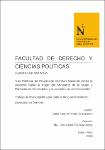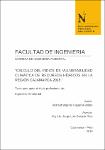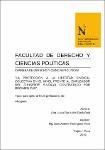| dc.contributor.advisor | Cepeda Gamio, Patricia Malena | |
| dc.contributor.author | Montes Palacios, Richard Enrique | |
| dc.date.accessioned | 2024-11-20T16:35:50Z | |
| dc.date.available | 2024-11-20T16:35:50Z | |
| dc.date.issued | 2023-11-07 | |
| dc.identifier.citation | Montes, R. E. (2024). Las políticas públicas en la población afrodescendiente: caso comunidad de Capote, Picsi 2016-2022 [Tesis de licenciatura, Universidad Privada del Norte]. Repositorio de la Universidad Privada del Norte. https://hdl.handle.net/11537/38468 | es_PE |
| dc.identifier.other | . | es_PE |
| dc.identifier.uri | https://hdl.handle.net/11537/38468 | |
| dc.description.abstract | La presencia afrodescendiente en el Perú ha sido invisibilizada, incluso en los censos del siglo XX no se consideraba la categoría étnica como un factor de identificación o autoidentificación, lo que habría ayudado a conocer, sus necesidades básicas o su nivel de instrucción, etc. Esto se debió en gran parte a la idea de construir un país mestizo con una herencia indígena, lo que invisibilizó el aporte afrodescendiente a la construcción de nuestra memoria histórica, además lo relegó a ser parte de una herencia principalmente cultural, es decir, se le incluyó dentro de la tradición o patrimonialización, más no de la realidad presente, obviando sus derechos como acceso a la salud y educación.
En ese sentido, el Estado ha sido el responsable de esta invisibilización y por ende de la ausencia de políticas públicas a favor de la población afrodescendiente. Pero ¿Por qué son importantes las políticas públicas? Porque ellas recogen a través de leyes, planes, estrategias las necesidades de los grupos vulnerables e intentan reducir las brechas sociales, otorgando derechos a los grupos que conforman la nación. Nuestro interés es conocer, si ha existido o existe algún proyecto de inclusión social de este grupo vulnerable y cómo se ha pensado en reconocerles sus derechos universales a la educación y la salud pública en un contexto de crecimiento económico. | es_PE |
| dc.description.abstract | The Afro-descendant presence in Peru has been made invisible, even in the 20th century censuses the ethnic category was not considered as a factor of identification or self-identification, which would have helped to know how many there were, their basic needs or their level of education. This was largely due to the idea of building a mestizo country with an indigenous heritage, which made the Afro-descendant contribution to the construction of our historical memory invisible, also relegating it to being part of a mainly cultural heritage, that is, it was included within the tradition or patrimonialization, but not of the present reality, ignoring their rights such as access to health and education.
In this sense, the State has been responsible for this invisibility and therefore for the absence of public policies in favor of the Afro-descendant population. But why are public policies important? Because they collect through laws, plans, strategies the needs of vulnerable groups and try to reduce social gaps, granting rights to the groups that make up the nation. Our interest is to know if there has been or exists any social inclusion project for this vulnerable group and how it has been thought of recognizing their universal rights to education and public health in a context of economic growth. | es_PE |
| dc.description.uri | Tesis | es_PE |
| dc.format | application/pdf | es_PE |
| dc.format | application/msword | es_PE |
| dc.language.iso | spa | es_PE |
| dc.publisher | Universidad Privada del Norte | es_PE |
| dc.rights | info:eu-repo/semantics/openAccess | es_PE |
| dc.rights.uri | https://creativecommons.org/licenses/by-nc-nd/3.0/us/ | * |
| dc.source | Universidad Privada del Norte | es_PE |
| dc.source | Repositorio Institucional - UPN | es_PE |
| dc.subject | Políticas públicas | es_PE |
| dc.subject | Afroamericanos | es_PE |
| dc.subject | Derechos civiles | es_PE |
| dc.subject | Grupo minoritario | es_PE |
| dc.subject | Government policy | es_PE |
| dc.subject | Afro-descendants | |
| dc.subject | Minority group, Community | |
| dc.title | Las políticas públicas en la población afrodescendiente: caso comunidad de Capote, Picsi 2016-2022 | es_PE |
| dc.type | info:eu-repo/semantics/bachelorThesis | es_PE |
| thesis.degree.grantor | Universidad Privada del Norte. Facultad de Derecho y Ciencias Políticas | es_PE |
| thesis.degree.level | Título Profesional | es_PE |
| thesis.degree.discipline | Derecho y Ciencias Políticas | es_PE |
| thesis.degree.name | Abogado | es_PE |
| dc.publisher.country | PE | es_PE |
| dc.subject.ocde | https://purl.org/pe-repo/ocde/ford#5.05.01 | es_PE |
| thesis.degree.program | Pregrado | es_PE |
| dc.description.sede | Los Olivos | es_PE |
| renati.advisor.dni | 08144095 | |
| renati.advisor.orcid | https://orcid.org/0000-0003-2698-4629 | es_PE |
| renati.author.dni | 43495516 | |
| renati.discipline | 421056 | es_PE |
| renati.juror | Tello Moncada, Yery Edelmira | |
| renati.juror | Olano Romero, Rodrigo | |
| renati.juror | Cépeda Gamio, Patricia | |
| renati.level | https://purl.org/pe-repo/renati/level#tituloProfesional | es_PE |
| renati.type | https://purl.org/pe-repo/renati/type#tesis | es_PE |
| dc.relation.conformsto | 4% | es_PE |










